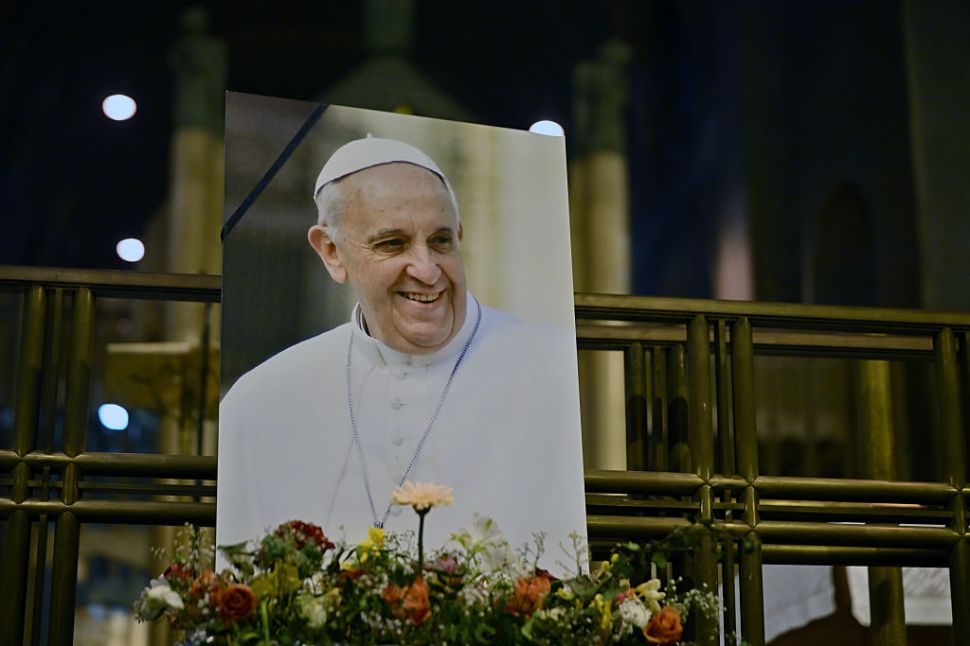Pope Francis is displayed during a memorial service.” width=”970″ height=”647″ data-caption=’Pope Francis passed away on April 21 at age 88. <span class=”lazyload media-credit”>Dursun Aydemir/Anadolu via Getty Images</span>’>
The next Pope will inherit not only Pope Francis’s bold and controversial legacy of institutional reform, but also the formidable challenge of fixing the Vatican’s fragile finances. Before his death, Francis was entrenched in an uphill battle to close the Vatican’s chronic budget deficit, reform the scandal-ridden Vatican Bank and address a pension system that remains severely underfunded.
Behind the scenes, Francis operated more like a hard-nosed CEO than a spiritual leader—unyielding on spending and laser-focused on fiscal discipline. Since 2021, he slashed salaries for the Vatican’s roughly 250 cardinals three times, reduced housing subsidies for senior staff, and frozen new hiring across the city-state—all in service of balancing the books.
Recognizing that traditional Vatican officials lacked the financial expertise needed for the job, Francis assembled an outside team of professionals to modernize Church finances. The team included Jean-Baptiste de Franssu, a former CEO of Invesco Europe; Jochen Messemer, CEO of ERGO Insurance Group; Joseph F. X. Zahra, chairman of Malta’s largest bank; and George Yeo, the former prime minister of Singapore.
The team dismantled archaic financial systems and enlisted global accounting firms to help bring Vatican finances up to international standards. In 2014, Francis consolidated the city-nation’s financial roles into a single body called the Secretariat of the Economy, effectively a CFO. The body is currently led by Benjamín Estévez de Cominges, an MIT graduate.
The Vatican oversees several distinct financial entities. One is the city-state itself, which functions like a small municipal government and is primarily funded by tourism, museum tickets and souvenir sales, since it lacks a tax base. The other is the Roman Curia, the Catholic Church’s global bureaucracy, which oversees embassies, investigative functions, pension management and nine administrative departments resembling government ministries.
It’s the Curia that has remained mired in red ink. For years, it has operated with annual deficits exceeding $50 million, against expenditures nearing $1 billion. Its pension system had an unfunded liability of approximately $1.7 billion as of 2015, and recent figures remain unavailable.
In 2015, the Secretariat for the Economy warned of “an alarming trend in Holy See finances.” More recently, in November 2023, Francis acknowledged the pension fund’s “serious prospective imbalance” and appointed Cardinal Kevin Farrell to oversee it—informally dubbed the Vatican’s “pension czar.”
The Vatican Bank—formally known as the Institute for the Works of Religion—has also undergone sweeping reforms under Francis. With estimated assets between $6 billion and $8 billion, it’s small by global standards but uniquely influential. In 2012, shortly before Francis’s papacy began, the Council of Europe’s Moneyval committee issued a scathing 241-page report detailing the bank’s shortcomings, including ties to money laundering and historical controversies involving Nazi-linked assets.
Francis responded by shuttering hundreds of suspicious accounts, moving asset management responsibilities to a newly created entity called Vatican Asset Management, and implementing stringent transparency regulations. He appointed de Franssu as president of the Vatican Bank to spearhead the reforms. Resistance from within the Vatican’s entrenched bureaucracy was intense—some officials even attempted to cancel a PwC audit initiated by Francis.
Yet despite these efforts, the financial system remains precarious. Budget and pension deficits linger, and trust in Vatican banking remains fragile. Whoever succeeds Francis will inherit a leaner, more accountable financial apparatus—but one still riddled with liabilities. The next Pope, in short, will need to be as unyielding a fiscal steward as his predecessor—if not more so.

